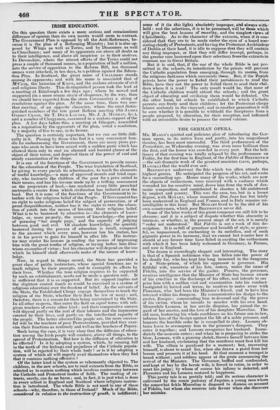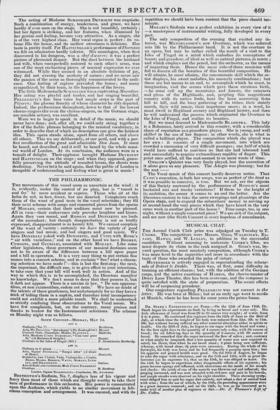THE GERMAN OPERA.
MR. MASON'S spirited and judicious plan of introducing the Ger- man opera, in its native form and purity, into his magnificent theatre, has been most successful. The third performance of the Frei schutz, on Wednesday evening, was even more brilliant than the first, and the house was crowded in every part. But the bril- Haney of that evening was totally eclipsed by the performance on Friday, for the first time in England, of the Fidelio of BEETHOVEN —the sole dramatic work of the greatest musician (save, perhaps, HANDEL) that the world ever saw.
BEETHOVEN underwent the fate which too often attends the highest genius. He anticipated the progress of his art, and wrote for a succeeding age. Hence many of his works, winch are now the objects of enthusiasm, were received with a coolness which wounded his too sensitive mind, drove him from the walk of dra- matic composition, and contributed to shorten a life embittered by neglect and penury. This was the case, too, but in a lesser degree, with MozAnr, whose immortal Don Juan has but lately been understood in England and France, and in Italy remains un- intelligible to this hour. But MOZART lived to be the idol of his own countrymen, which poor BEETHOVEN never did.
Some of the later works of this great composer are still felt to be obscure; and it is a subject of dispute whether this obscurity is intrinsic, or whether, in the present stage of the art, it is merely " order not understood." But Fidelio is not a work of this de- scription. It is so full of grandeur and breadth of style, so grace- ful, so impassioned, so enchanting in its melodies, and of such gigantic power in its harmony, that we cannot but wonder how it should at any former time have failed in exciting the enthusiasm with which it has been lately welComed in Germany, in France, and now in England.
The drama is exceedingly elegant and interesting. The story is that of a Spanish nobleman who has fallen into the power of his deadly foe, who has kept him long immured in the dungeons of a State-prison, of which his oppressor is governor. His faithful wife, uncertain of his fate, enters, under the name of Fidelio, into the service of the gaoler. Pizarro, the governor, receives intelligence that the Minister of State has become aware of his cruelties in the discharge of his office, and intends to sur prise him with a sudden visit and examination into his conduct: Instigated by hatred and terror, he resolves to make away with Florestan, who had been the Minister's friend, and to haVe him interred within his dungeon. He communicates his design to the gaoler, Rocquo ; commanding him to descend and dig the grave of his victim. whom he intends to murder with his own hand. Meanwhile Leonora, in her servile disguise, has gained the re- gard of her master, and the love of his daughter Marceline. The old man, bestowing his whole confidence on his future son-in-law, informs him of the design against the life of a noble prisoner, and , laments the horrible order he is compelled to obey. Leonora ob- tains leave to accompany him to the Prisoner's dungeon. They enter it together; and Leonora recognizes her husband. Imme- diately the-assassin enters; and when he is preparing to strike the blow, Leonora, with a piercing shriek, throws herself between him and her husband, exclaiming that the murderer must first kill his wife. The villain is paralysed for a moment; but, recovering himself, is about to assail her, when she draws a pistol from her bosom and presents it at his head. At that moment a trumpet is heard,without ; and soldiers appear at the grate announcing the arrival of the Minister. The Governor, baffled and confounded, and kept at bay by the heroic wife, is forced to retire, in order to meet his judge; by whom of course his infamy is detected, and Florestan and his Leonora restored to happiness. This pretty tale is as prettily told; and its serious character is enlivened by the comic jealousy of Jaquino, a young man whom the somewhat fickle Marceline is disposed to dismiss on account of Fidelio, but whom she receives into favour when she discovers her mistake. The acting of Madame SCHROEDER DEVRIENT. was exquisite. Such a combination of energy, tenderness, and grace, we have hardly.if ever; seen on the stage. She is not beautiful, certainly ; but her figure is striking, and her features, when illumined by her genius .andfeeling, becothe very attractive. As a singer, she is of the. very highest, class. Her vocal organ is perfect : its vo- lume fills the house, and .its mellow sweetness is delicious. Her taste is purity. itself. For HAITZINGLER'S performance ofFIorestan we felt an admiration hardly inferior. His monologue, when first discovered in his dungeon, was a chef d'oeuvre; it was a perfect picture of phrensied. despair. But the duet between the husband and wife, when unexpectedly restored to each other's arms, was one of the most enchanting pieces of musical expression we ever
witnessed. While they seemed in an absolute delirium of joy, they did not o'erstep the modesty of nature ; and we never saw the passion of the scene so thoroughly communicated to the audi- ence. One feeling of rapture pervaded the house; and many sympathized, by their tears, in the happiness of the lovers.
The little Mademoiselle Sc NEIDER was a captivating Marceline. Her acting was playful and tender, and her singing beautiful. PELLEGRINI'S fine bass voice had ample scope in the part of Pizarro; the gloomy ferocity of whose character he ably depicted. Indeed, the performance throughout, doWn to that of the lowest chorus-singers (for even the chorus-singers, on the German stage, are sensible actors), was excellent.
Were we to begin to speak in detail of the music, we should never have done; and, after all, we could only string together a few of the feeble phrases belonging to the musical vocabulary, in order to describe that of which no description can give the faintest idea. This opera stands alone, apart from all others, and above all others. This we say deliberately, at our peril, and with a per- fect recollection of the great . and admirable Don Juan. It must be heard, not described ; and it will be heard by the whole musi- cal world of London. At its conclusion, the audience were in a tumult of delight. Their applause brought Madame DEVRIENT and HAITZINGLER on the stage ; and when they appeared, grace- fully preserving the attitude of reunited lovers, the shouts were deafening. Nev•er let it be said again, that the public of London is incapable of understanding and feeling what is great in music !



























 Previous page
Previous page